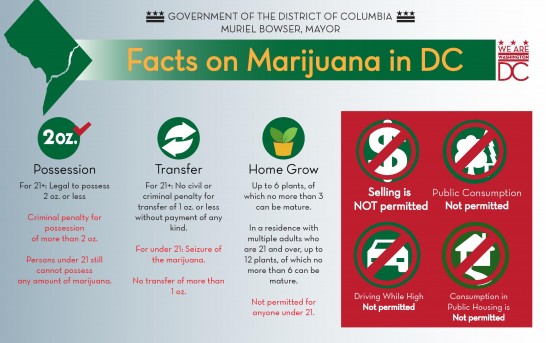How Does Initiative 71 Affect the Drug-Free Workplace?
March 3, 2015 •Julie Weber

 Last Wednesday, Summit conducted our annual Drug-Free Workplace Training. We had planned this training for some time, and did not realize when we scheduled it, that it would land on the eve of the new DC marijuana law – Initiative 71 - going into effect. While Initiative 71 did provide interesting fodder for discussion, the passage of this initiative did not impact our Drug-Free Workplace policy or program, where marijuana was and remains illegal under federal law (see the Controlled Substances Act), and Summit, due to the fact that we are a Federal contractor, is subject to the federal law.
Last Wednesday, Summit conducted our annual Drug-Free Workplace Training. We had planned this training for some time, and did not realize when we scheduled it, that it would land on the eve of the new DC marijuana law – Initiative 71 - going into effect. While Initiative 71 did provide interesting fodder for discussion, the passage of this initiative did not impact our Drug-Free Workplace policy or program, where marijuana was and remains illegal under federal law (see the Controlled Substances Act), and Summit, due to the fact that we are a Federal contractor, is subject to the federal law.
Still, it is important for all DC employers to know that Initiative 71 (as well as the 2010 DC medical marijuana law) in no way forces an employer to allow their employees to use or possess marijuana at work, even for an employee with an underlying medical condition. In fact, for employers like a Federal contractor or a Federal grantee, quite the opposite is true: both of these groups are required to make sure that their workplace is free of drugs, including Schedule 1 drugs, such as marijuana. Moreover, Initiative 71 specifically allows employers to continue to enforce policies restricting marijuana use by their employees.
However, the new law, in allowing residents and visitors over 21 to possess up to 2 ounces of marijuana and to grow up to six marijuana plants (though only 3 can be mature plants) in their private residence, as well as to consume the drug at their home, and even transfer one ounce to another person over 21, does bring up attendant questions for all kinds of employers. These questions include:
- What happens if an employee consumes his/her own marijuana over the weekend or before or after work, and comes to work high and unable to perform work well? What is the duty or responsibility of the company to attend to this situation? One invaluable part of our training last week was teaching supervisors and employees about the signs of marijuana use (and other drugs) and the impact each of these drugs has on job performance, so that they could recognize this situation when it arises.
- What happens if a company requires random drug testing, and an employee still has a trace of marijuana in his/her system at the time of the testing, but he/she is performing well at work? (We do not test for drugs as part of our Drug-Free Workplace program, and we are a federal contractor. However, if you are a company who does conduct drug testing and is not bound by the Drug-Free Workplace Act, what would you do in this situation?)
- What happens if an applicant has been convicted of possession or use of marijuana in the past, prior to the enactment of this law? Should it count against them? Should it affect whether you will give them a job offer or not? The DC government has given some guidance related to this matter, stating that “employers may not inquire about a prior conviction until they have made a conditional offer of employment. Same goes for when you can ask a prospective employee to take a drug test.”
The answers to these questions will likely vary from employer to employer, depending on many factors, including if the employer is the Federal Government, a Federal contractor or grantee, or a private employer; the kind of industry involved; the purpose of the respective workplace drug policy at hand; and more.
What is your company’s stance on these questions, and how do you think Initiative 71 will impact your workplace?
Get Updates
Featured Articles
Categories
- affordable housing (12)
- agile (3)
- AI (4)
- budget (3)
- change management (1)
- climate resilience (5)
- cloud computing (2)
- company announcements (15)
- consumer protection (3)
- COVID-19 (7)
- CredInsight (1)
- data analytics (82)
- data science (1)
- executive branch (4)
- fair lending (13)
- federal credit (36)
- federal finance (7)
- federal loans (7)
- federal register (2)
- financial institutions (1)
- Form 5500 (5)
- grants (1)
- healthcare (17)
- impact investing (12)
- infrastructure (13)
- LIBOR (4)
- litigation (8)
- machine learning (2)
- mechanical turk (3)
- mission-oriented finance (7)
- modeling (9)
- mortgage finance (10)
- office culture (26)
- opioid crisis (5)
- Opportunity Finance Network (4)
- opportunity zones (12)
- partnership (15)
- pay equity (5)
- predictive analytics (15)
- press coverage (3)
- program and business modernization (7)
- program evaluation (29)
- racial and social justice (8)
- real estate (2)
- risk management (10)
- rural communities (9)
- series - loan monitoring and AI (4)
- series - transforming federal lending (3)
- strength in numbers series (9)
- summer interns (7)
- taxes (7)
- thought leadership (4)
- white paper (15)



